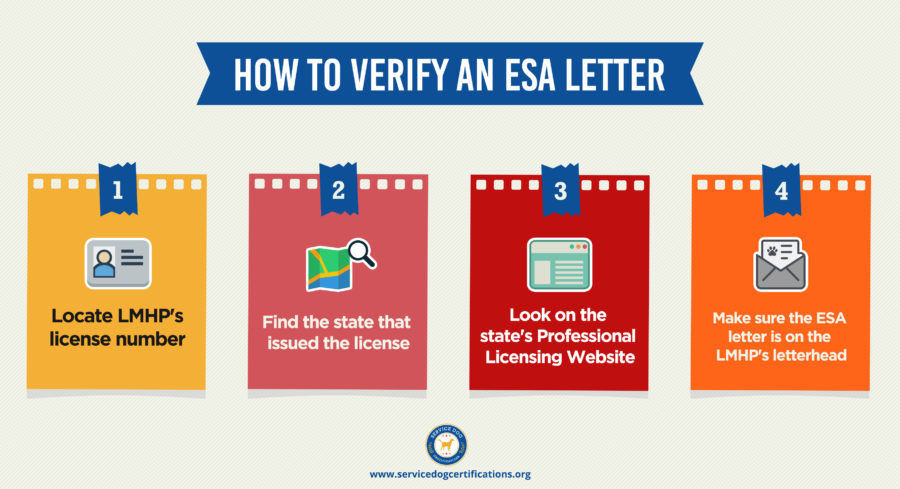Home Page › Blog › Landlord Rights for Emotional Support Animals
Landlord Rights for Emotional Support Animals

According to the NAMI, an estimate of 61.5 million Americans (or 1 in 4) suffer from a mental or emotional disability.
For this reason, the use of Emotional Support Animals (ESA) is becoming more prevalent, and many mental health professionals are recommending animals and writing prescriptions as a therapy tool.
As a landlord or property owner, you might ask yourself, what does that mean for me and for my rental units that have “no pets” policies in place?
In this post, we will cover landlord rights when renting to a tenant with an emotional support animal.
Table of Contents
- The Fair Housing Act (FHA) & Landlords
- Emotional Support Animal Letters for Housing
- How Can a Landlord Verify an ESA Letter?
- ESA Questions a Landlord Has the Right to Ask a Tenant
- ESA Questions a Landlord Does Not Have the Right to Ask a Tenant
- What Kind of Animals Do Landlords Have to Allow?
- How Many Emotional Support Animals Do Landlords Have to Allow?
- Where is the Emotional Support Animal Allowed?
- When Can a Landlord Deny an Emotional Support Animal?
- What About Insurance for Banned Breeds?
- When Can a Landlord Evict a Tenant With an ESA?
- What Fees (If Any) Can a Landlord Charge for an ESA?
- What Could Happen if a Landlord Denies a Tenant Based on an ESA?
The Fair Housing Act (FHA) & Landlords
Under the Fair Housing Act, it is against the law for a property owner or landlord to refuse to house those with a disability.
The housing provider also cannot impose a different application or qualification criteria to those with disabilities. This means the rental fees, sales price, or rental terms or conditions cannot differ from those required by non-disabled persons.
However, the FHA does require written documentation or ESA letter from a licensed mental health professional attesting to the tenant’s need for an Emotional Support Animal. Simply having an ESA registration or vest is not enough to qualify an animal as an ESA.

Emotional Support Animal Letters for Housing
You may or may not have encountered an Emotional Support Animal Letter – these are validation letters from a licensed mental health professional telling you the renter has been prescribed the animal for mental health-related purposes.
This animal is NOT a pet but is there to give the needed therapy the person requires – the emotional support animal or ESA must be responsible for alleviating at least one identified symptoms or effects of an existing disability. This does not mean the animal simply makes the person “feel good.” The ESA must be there for a diagnosable condition such as depression, severe anxiety or phobia.
How Can a Landlord Verify an ESA Letter?
As a landlord, you do have the right to verify that the letter from the therapist is real and from a therapist that is licensed. To do this, you will need to check that the letter is written on the mental health professional’s letterhead, along with their contact information (phone number, email address, practice address).
An ESA Letter should include the professional’s license number, date it was issued, and signature.
If you have any concerns about the validity of the letter, you should NOT contact the mental health professional directly. This could be considered a violation of the patient’s right to privacy.
Questions a Landlord Has the Right to Ask a Tenant That Needs an Emotional Support Animal
As a landlord you have the right to ask your tenant the following questions about their emotional support animal. Remember how you ask is important as well. Here are some tips for speaking with your tenant about their Emotional Support Animal.
Tip 1: Politely speak to the tenant about your concerns.
Let them know you would like to work together to alleviate your concerns. Arguing with the person can make them feel discriminated against and can be used against you should the case go in front of a judge.
Tip 2: Verify the licensed mental health professional’s license number.
You do have the right to verify the mental health professional’s credentials. You can do this by visiting the listed state’s website for the mental health professional’s licensure and entering their license number. You cannot repeatedly call or their LMHP or ask them details about their client’s disability.
Tip 3: Ask tenant for a Reasonable Accommodation Form.
As a landlord, you have the right to ask your tenant for a Reasonable Accommodation Form which would be filled out by the mental health professional that wrote the letter.
Questions a Landlord Does Not Have the Right to Ask a Tenant That Needs an Emotional Support Animal
Remember, you cannot contact the tenant’s therapist directly. There are also limits to the questions you are permitted to ask.
There are several common questions that go against the disabled person’s rights and should not be asked, examples include:
- “Do you have a disability and how severe is it?”
- “How long have you been in therapy?”
- “What medications (if any) do you take?”
- “Let me see your medical records?”
- “Have you ever been hospitalized because of a mental disability?”
- “Have you ever been in a drug rehabilitation program?”
- “How many sessions have you had with your therapist?”
- “Is there anything else at all about your symptoms or diagnosis besides what is provided in this letter?”
What Kind of Animals Do Landlords Have to Allow?
Although dogs and cats are the most common animals used for therapy, your tenant has the right to possess just about any animal as an emotional support animal.
However, that does not mean you have to allow a pet tiger or full-grown horse inside your building. Animals that pose a danger to other tenants or causes an undue financial burden to you can be denied.
Remember, that the tenant is always responsible for their animal(s).
How Many Emotional Support Animals Do Landlords Have to Allow?
The tenant is allowed, under Federal law, to have more than one emotional support animal. As long as the therapist has diagnosed these animals to help alleviate at least one of their patient’s symptoms, it is allowed.
The law does not specify the number allowed or not allowed. It would be difficult to argue against 3 dogs, but if you find that having 10 chickens in the apartment is causing a disturbance or an undue financial burden, you may have the right to deny the request.
Where is the Emotional Support Animal Allowed?
The Department of Housing and Urban Development (HUD) has deemed it possible for the tenant to bring their ESA;
“in all areas of the premises where persons are normally allowed to go unless doing so would impose an undue financial and administrative burden or would fundamentally alter the nature of the housing provider services.”
Generally speaking, this would allow the animal in all common areas of the building and the tenant’s apartment.
However, Emotional Support Animals are not permitted to roam off leash throughout the property and must be in their handler’s control at all times.
When Can a Landlord Deny an Emotional Support Animal?
This is a tricky situation; however, there are times when the law is in the landlord’s favor. To deny a tenant the Emotional Support Animal, the animal must be:
- Causing an administrative, financial, or programmatic repercussion to the premises
- Causing disturbance to other tenants
If the emotional assistance animal is particularly disruptive, or the tenant fails to take proper measures to ensure that the animal does not bother other tenants, the landlord may be justified in denying the accommodation or ultimately filing for an eviction.
What About Insurance for Banned Breeds?
Some regions are now imposing breed restriction laws. How does this affect the person with a breed restricted ESA?
According to HUD:

However, it’s not as simple as that. The landlord must then substantiate the claim with the insurance company directly. He or she must then see if the insurance company has a policy that has an exception for the assistance animal. If not, then an investigation may be launched against the insurance company itself for potential disability discrimination. We do not recommend denying a tenant’s Emotional Support Animal due to their breed.
When Can a Landlord Evict a Tenant With an Emotional Support Animal?
There may be circumstances that arise when a landlord does have a right to evict a tenant with an ESA. This will be if the person’s emotional support animal is a threat to the safety of the building or the tenants or the presence of the animal is causing an undue burden on the landlord.
What Fees (If Any) Can a Landlord Charge for an Emotional Support Animal?
According to HUD’s handbook for subsidized multifamily programs:
“A housing provider may not require an applicant or tenant to pay a fee or a security deposit as a condition of allowing the applicant or tenant to keep the emotional support animal.”
However, a landlord can charge fees to repair any damages to a tenant with an Emotional Support Animal. An emotional support animal is not a “get out of jail” free card when it comes to damages caused by the animal. Each tenant is responsible for their animal’s actions and behaviors.
Occupancy Requirements of Subsidized Multifamily Housing Programs, HUD, No. 4350.3, 2-44(E) (2013). 5
“If the emotional support animal causes damage to the housing unit or the common areas of the dwelling, however, the housing provider may charge the cost of repairing the damage.”
What Could Happen if a Landlord Denies a Tenant Based on an Emotional Support Animal
If a tenant believes they have been mistreated due to their ESA, they can file a lawsuit under the Housing and Urban Development Act within one-year of the incident.
HUD will then investigate the complaint at no cost to the disabled individual (the person can also go to the federal district court within two years of the alleged denial).
If the case is substantiated, it will then go to an administrative hearing with HUD attorneys litigating the case.
An Administrative Law Judge (ALJ) will consider all the evidence from the tenant and the landlord. If the ALJ decides that discrimination occurred, the respondent (landlord) can be ordered:
- To compensate the tenant for actual damages, including humiliation, pain, and suffering.
- To provide injunctive or other equitable relief.
- To pay the Federal Government a civil penalty to vindicate the public interest. The maximum penalties are $16,000 for a first violation and $70,000 for a third violation within seven years.
- To pay reasonable attorney’s fees and costs.
Know the Law as a Landlord
You do have rights as a landlord; however, it can be tricky. Before you attempt to evict or deny a person with an ESA, you will need to be sure you are in the right, or you could be facing some stiff penalties.
About the Author: The writing team at Service Dog Certifications is made up of folks who really know their stuff when it comes to disability laws and assistance animals. Many of our writers and editors have service dogs themselves and share insights from their own experiences. All of us have a passion for disability rights and animals.
153 comments
Leave a Reply Cancel reply
Latest Posts

How to Bring a Service Dog to Disneyland
Trained service dogs are more than welcome to join their handlers at Disneyland. In this guide, we’ll explain Disneyland’s policies and give practical advice for bringing a service dog to Disneyland for the first time. Disneyland’s Service Dog Policies The Magic Kingdom is happy to welcome trained service dogs across most park locations! They kindly […]

Read More

Can Dogs Eat Tomatoes?
Yes! Dogs can safely enjoy tomatoes, but there are a few risks to be aware of so you can feed your dog responsibly. Fully ripe tomatoes (without the stems and leaves) can actually have nutrients that are good for your pup. Tomatoes have chlorogenic acid, an antioxidant that can have anti-inflammatory effects in cells. They’re […]

Read More

Can a Primary Care Doctor Write an ESA Letter?
Your family doctor, also called a primary care physician (PCP), can write a letter recommending an emotional support animal. We’ll explain what legally gives them that ability and explore what better options might be available for you. Why are Physicians Able to Write an ESA Letter? To turn your pet into an emotional support animal, […]

Read More







This article states that “You cannot repeatedly call or their LMHP or ask them details about their client’s disability” and that “If you have any concerns about the validity of the letter, you should NOT contact the mental health professional directly. This could be considered a violation of the patient’s right to privacy.” Technically, this is incorrect, as there are no laws restricting someone from contacting medical professionals and asking questions. HIPAA only applies to healthcare providers and prevents the medical professional from sharing information about their patients without consent, but it does not prevent someone from asking them questions or seeking consent to share their information. It would be better to word the statement as “You SHOULD not repeatedly call or contact their LMHP or ask them details about their client’s disability, AS they may be prohibited from sharing that information.”
My landlord denied my dog of 5 years due to her not being 30b pounds or less. So i got rid of her and went through severe depression ..And anxiety without her there isn’t a day that goes by i don’t break down for her.
Landlords are not allowed to deny an emotional support animal simply because it is a certain weight.
What happens when an applicant states on the application that they do not have a dog. When they pick up the keys to move in, they hand the landlord a letter stating they have an emotional support pet. Is that fair?
In these situations the landlord must still consider the tenant’s ESA request. We advise tenants to be up front with their ESA needs, but some tenants obtain their ESAs later or disclose them at a later time.
I provided my landlord with a valid Emotional Support Animal letter from my Nurse practitioner. This was done before I moved in to where I was going to be living and to the BEST of my knowledge there has not been any type of problem. I’m not in any type of arrears on my rent, no other issues with other Tenants. Nothing at all. But tonight I was just casually talking to her son and he tells me a very shocking piece of misinformation, that she didn’t have to accept the documentation I had given her. That it was entirely up to the landlord to whether they wanted to allow the animal in their building. BUT from my understanding of the law, this is not correct. As a person with a disability, I thought I was protected by the Fair Housing Act. So is the son right or am I? At this point I suspect it’s moot. But one of my diagnosed conditions is General Anxiety Disorder so I’m feeling a little bit worried about it.
Landlords can only reject a tenant’s request to live with an ESA in limited circumstances. The main exemptions are if the landlord has evidence that the ESA would pose a safety or health hazard to others. You should ask your landlord what exemption they are relying on to reject your emotional support animal.
what can I do if my landlord is discriminating against my already existing esa dog?
The best thing is to try to come to a reasonable compromise through discussion with your landlord. If you feel however that is going nowhere and your rights are being violated, you can file a complaint through HUD.
Our Coop building has put in a rule that you cannot leave your ESA cat longer than 72 consecutive hours. That would mean I cannot travel for work, vacation, etc.even though I have a person that comes in and cares for her. Is this legal?
Rules Governing Care and Conduct
1. Health: The animal must be properly inoculated and free from diseases. All licenses and vaccinations must be
current and the animal must have an annual clean bill of health from a licensed veterinarian, of which a copy needs to be
submitted to the Ocean East office.
2. A dog shall not be left unattended in your unit for more than ten (10) consecutive hours at a time, or other types of
indoor-only animals for more than seventy-two (72) consecutive hours. Your animal must be removed from the premises
at any time in which the disabled person is not physically present for more than thirty-six (36) hours.
ESA owners are allowed to have others take care of their animals when they are away.